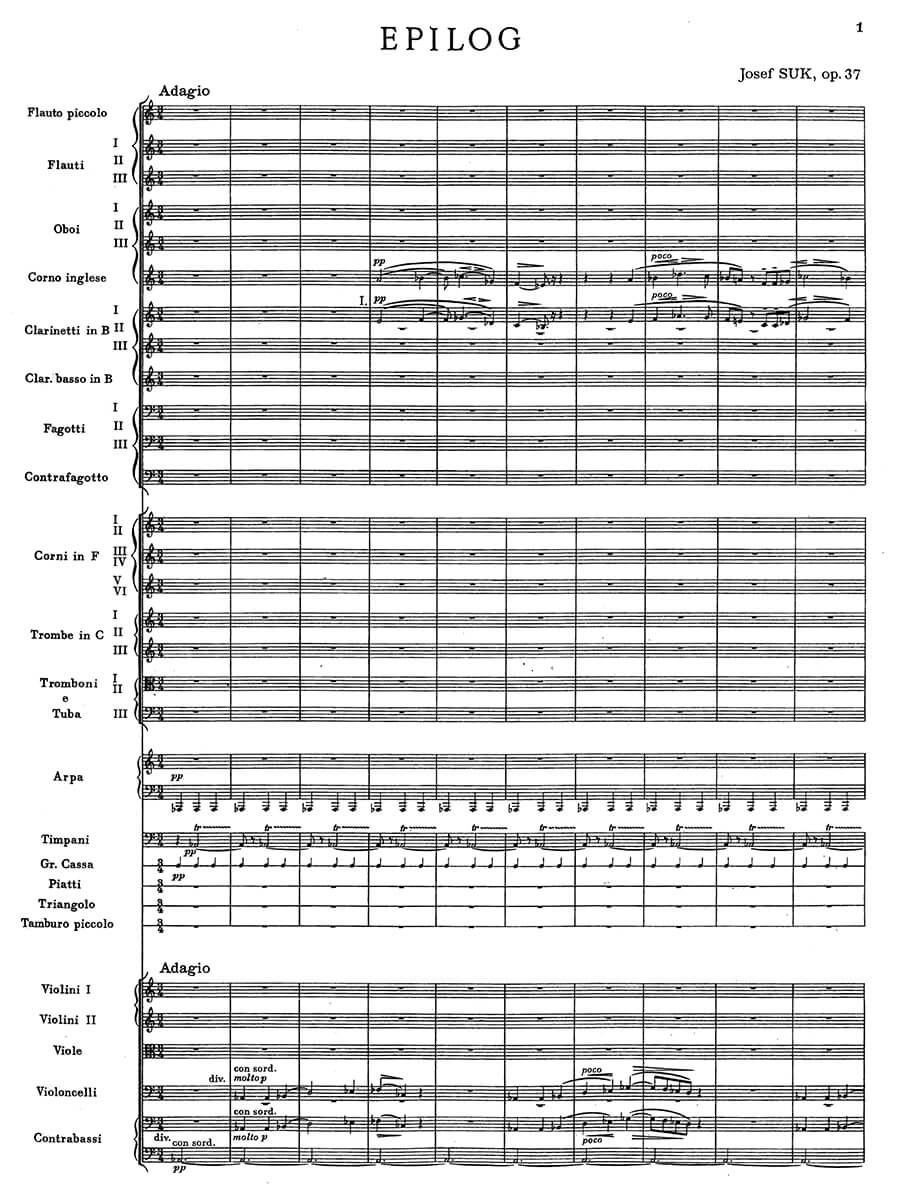Epilog Op. 37 for choir and orchestra
Suk, Josef
40,00 €
Preface
Josef Suk – Epilog Symfonická skladba pro orchestr, velký a malý smíseny sbor, soprán, baryton a bas op. 37
(b. Křečovice, 4 January 1874 — d. Benešov, 29 May 1935)
Symphonic Piece for Orchestra, Large & Small Mixed Choruses, Soprano, Baritone & Bass, Op. 37 (1920-29/rev. until 1932)
I Kroky (Schritte). Adagio (p. 1) – Vivace (p. 22) –
II Píseń matek (Lied der Mutter). Andante semplice (p. 54) – (string. al:)
III Od věčnosti do věčnosti (Von Ewigkeit zu Ewigkeit). Allegro appassionato (p 81) –
IV Tajemný úžas a neklid (Mystisches Staunen und Unruhe). Adagio maestoso e mesto (p. 131) –
V Poutník-těšitel (Der Pilger und Tröster). Adagio molto tranquillo, pastorale semplice (p. 148)
Preface
Although far more frequently performed in the last two decades than hitherto, Josef Suk’s orchestral music has not received a fraction of the appreciation it deserves in view of its outstanding quality. As a young man Suk was a composer of manifest lyrical delicacy, a superb craftsman who instantaneously captivated his audience with those characteristic Bohemian traits of the post-Dvořák era: warmth of feeling and unaffected musicality. His Dramatic Overture, op. 4 (1891-2), was immediately followed by the miraculous Serenade in E-major for String Orchestra, op. 6 (1892), which made his name famous for all times. His great Symphony in E-major, op. 14 (1897-9) was followed in 1899-1900 by Pohádka (Fairy-Tale, op. 16), an orchestral suite compiled from incidental music he had written for Julius Zeyer’s stage adaptation of the ancient Slavic fairy-tale Radúz a Mahulena (1897-8). At that time Suk was promised the hand of Dvořák’s daughter Otilka in marriage, appeared internationally as second violinist in the celebrated Czech String Quartet, and already enjoyed high esteem as a composer. Later he would wistfully recall that “the time I spent working on Radúz was the happiest period of my life.” The story of the young lovers Radúz and Mahulena played a central role in Suk’s life and artistic philosophy. His happiest years with his wife Otilka were a correlative of that story, and his love a living myth.
The years 1902-3 saw the emergence of Suk’s Fantasy in G-minor for violin and orchestra (op. 24), the year 1904 his Fantastické Scherzo (op. 25) as well as the symphonic poem Praga (op. 26), a work inspired by Svatopluk Čech’s poem Žižka. (Jan Žižka, who died of the plague in 1424, was the legendary military commander of the Hussites, and the poem refers to the victory of his troops over the Prague forces at Battle of Malešov in 1424.) The death of his father-in-law Antonín Dvořák in 1904 left Suk stunned. It was at this time that he began to work on his largest and, in the long run, most famous orchestral composition to date: the tone-poem Asrael, op. 27 (1905-6), originally intended as a requiem for Dvořák. It was here that Suk found a truly independent voice – at the price of his happiness, for “at this time I was beset with the deepest sorrow, namely, the illness of the person dearest to me on earth.” His wife Otilka died in July 1905. Suk enlarged the conception of Asrael and named it after the Islamic angel of death. (Only Allah knows when a human being must die. Neither angels or devils know anything about it. When the hour arrives, Allah sends his archangel Asrael to to fetch the person’s soul.) The final two movements are dedicated to Suk’s deceased wife, the entire work to “the blessed memory of Dvořák and Otilka.” Later he confided, “A blow like that either destroys a man or causes all the powers within him to soar upward. I seemed to succumb to the former, but was redeemed by music.” …
Read preface / Vorwort > HERE
Score Data
| Edition | Repertoire Explorer |
|---|---|
| Genre | Choir/Voice & Orchestra |
| Pages | 208 |
| Size | 210 x 297 mm |
| Printing | Reprint |
